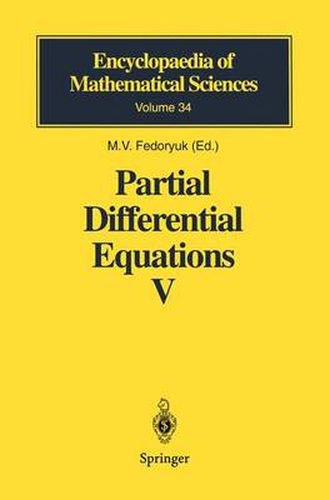Readings Newsletter
Become a Readings Member to make your shopping experience even easier.
Sign in or sign up for free!
You’re not far away from qualifying for FREE standard shipping within Australia
You’ve qualified for FREE standard shipping within Australia
The cart is loading…






This title is printed to order. This book may have been self-published. If so, we cannot guarantee the quality of the content. In the main most books will have gone through the editing process however some may not. We therefore suggest that you be aware of this before ordering this book. If in doubt check either the author or publisher’s details as we are unable to accept any returns unless they are faulty. Please contact us if you have any questions.
In this paper we shall discuss the construction of formal short-wave asymp totic solutions of problems of mathematical physics. The topic is very broad. It can somewhat conveniently be divided into three parts: 1. Finding the short-wave asymptotics of a rather narrow class of problems, which admit a solution in an explicit form, via formulas that represent this solution. 2. Finding formal asymptotic solutions of equations that describe wave processes by basing them on some ansatz or other. We explain what 2 means. Giving an ansatz is knowing how to give a formula for the desired asymptotic solution in the form of a series or some expression containing a series, where the analytic nature of the terms of these series is indicated up to functions and coefficients that are undetermined at the first stage of consideration. The second stage is to determine these functions and coefficients using a direct substitution of the ansatz in the equation, the boundary conditions and the initial conditions. Sometimes it is necessary to use different ansiitze in different domains, and in the overlapping parts of these domains the formal asymptotic solutions must be asymptotically equivalent (the method of matched asymptotic expansions). The basis for success in the search for formal asymptotic solutions is a suitable choice of ansiitze. The study of the asymptotics of explicit solutions of special model problems allows us to surmise what the correct ansiitze are for the general solution.
$9.00 standard shipping within Australia
FREE standard shipping within Australia for orders over $100.00
Express & International shipping calculated at checkout
This title is printed to order. This book may have been self-published. If so, we cannot guarantee the quality of the content. In the main most books will have gone through the editing process however some may not. We therefore suggest that you be aware of this before ordering this book. If in doubt check either the author or publisher’s details as we are unable to accept any returns unless they are faulty. Please contact us if you have any questions.
In this paper we shall discuss the construction of formal short-wave asymp totic solutions of problems of mathematical physics. The topic is very broad. It can somewhat conveniently be divided into three parts: 1. Finding the short-wave asymptotics of a rather narrow class of problems, which admit a solution in an explicit form, via formulas that represent this solution. 2. Finding formal asymptotic solutions of equations that describe wave processes by basing them on some ansatz or other. We explain what 2 means. Giving an ansatz is knowing how to give a formula for the desired asymptotic solution in the form of a series or some expression containing a series, where the analytic nature of the terms of these series is indicated up to functions and coefficients that are undetermined at the first stage of consideration. The second stage is to determine these functions and coefficients using a direct substitution of the ansatz in the equation, the boundary conditions and the initial conditions. Sometimes it is necessary to use different ansiitze in different domains, and in the overlapping parts of these domains the formal asymptotic solutions must be asymptotically equivalent (the method of matched asymptotic expansions). The basis for success in the search for formal asymptotic solutions is a suitable choice of ansiitze. The study of the asymptotics of explicit solutions of special model problems allows us to surmise what the correct ansiitze are for the general solution.